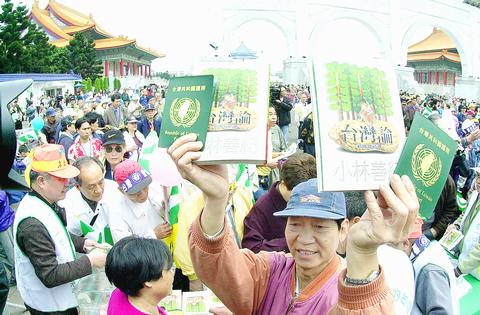Cheering "Say yes Taiwan, say no to China," roughly 5,000 advocates of Taiwan independence yesterday marched to the Presidential Office, calling for support from Taiwanese people worldwide for President Chen Shui-bian (陳水扁) and the establishment of the Republic of Taiwan.
On the first anniversary of the DPP victory in the 2000 presidential election, a large-scale parade was staged by the "Taiwan Nation Stands Up Coalition," composed of a number of pro-Taiwan independence groups. The World Taiwanese Congress, an organization founded in December by overseas Taiwanese from different countries who also hold a pro-independence stance, also participated in the march.

PHOTO: GEORGE TSORNG, TAIPEI TIMES
Before the event started, some also declared their pro-independence position by obtaining a "Republic of Taiwan" passport.
Carrying DPP flags and signboards reading "support Taiwan independence," those who joined the march blamed opposition parties for having caused chaos in society by thinking purely of their parties' interest. The march called for a joint effort by all Taiwanese people to empower the country.
"We are here to wake these people [who are pro-unification] who do not love Taiwan," said Stephen Lee (李勝雄), secretary-general of the World United Formosans for Independence (台獨建國聯盟) and general director of the march.
"We must unify to fight the PRC that encroaches on Taiwan," Lee added.
"There is still a long way to go before the establishment of the Republic of Taiwan. We should be patient and give Chen's government more time," appealed another leader of the event to the crowd.
Chen has been blasted for not insisting on the pro-independence stance of his party since taking over the presidency.
Yao Chia-wen (
Apart from Yao, two other senior advisers to the president, Lee Chen-yuan (李鎮源) and Ku Kuan-min (辜寬敏), participated in yesterday's event. National policy adviser to the president Huang Hua (黃華), Wu Shu-min (吳樹民) and Alice King (金美齡) were also present. King has caused controversy since defending the comic book On Taiwan and denying that she is an official of the ROC.
King candidly cast the ROC as "extinct" and for this, yesterday was regarded as a star by Taiwan independence supporters. Many participants swarmed toward King to shake her hand or to have their picture taken with her.
Some DPP lawmakers also joined the march.
The only Cabinet member to show up was Huang Tsung-le (黃宗樂), chairman of the Fair Trade Commission, but he didn't join the crowd. Previously, Huang and other Cabinet members were heavily criticized by opposition parties who said they had failed to remain neutral by participating in an anti-nuclear demonstration.
Chen Chin-chiung (陳金) and Cheng Kai-jen (鄭凱仁), participants in the event, blasted opposition parties, saying they had handicapped the Cabinet because they cannot face their failure in the last presidential election.
"Besides, pro-unification politicians brainwashed by the KMT cling to China because they expect benefits given by China," Cheng said.
The two also agreed with King. "The ROC simply doesn't exist anymore. Everybody [from the international community] has recognized the island as Taiwan," Chen said. "We should not deceive ourselves. A country's name is not so sacred that it cannot be changed."

SECURITY: As China is ‘reshaping’ Hong Kong’s population, Taiwan must raise the eligibility threshold for applications from Hong Kongers, Chiu Chui-cheng said When Hong Kong and Macau citizens apply for residency in Taiwan, it would be under a new category that includes a “national security observation period,” Mainland Affairs Council (MAC) Minister Chiu Chui-cheng (邱垂正) said yesterday. President William Lai (賴清德) on March 13 announced 17 strategies to counter China’s aggression toward Taiwan, including incorporating national security considerations into the review process for residency applications from Hong Kong and Macau citizens. The situation in Hong Kong is constantly changing, Chiu said to media yesterday on the sidelines of the Taipei Technology Run hosted by the Taipei Neihu Technology Park Development Association. With

CARROT AND STICK: While unrelenting in its military threats, China attracted nearly 40,000 Taiwanese to over 400 business events last year Nearly 40,000 Taiwanese last year joined industry events in China, such as conferences and trade fairs, supported by the Chinese government, a study showed yesterday, as Beijing ramps up a charm offensive toward Taipei alongside military pressure. China has long taken a carrot-and-stick approach to Taiwan, threatening it with the prospect of military action while reaching out to those it believes are amenable to Beijing’s point of view. Taiwanese security officials are wary of what they see as Beijing’s influence campaigns to sway public opinion after Taipei and Beijing gradually resumed travel links halted by the COVID-19 pandemic, but the scale of

A US Marine Corps regiment equipped with Naval Strike Missiles (NSM) is set to participate in the upcoming Balikatan 25 exercise in the Luzon Strait, marking the system’s first-ever deployment in the Philippines. US and Philippine officials have separately confirmed that the Navy Marine Expeditionary Ship Interdiction System (NMESIS) — the mobile launch platform for the Naval Strike Missile — would take part in the joint exercise. The missiles are being deployed to “a strategic first island chain chokepoint” in the waters between Taiwan proper and the Philippines, US-based Naval News reported. “The Luzon Strait and Bashi Channel represent a critical access

Pope Francis is be laid to rest on Saturday after lying in state for three days in St Peter’s Basilica, where the faithful are expected to flock to pay their respects to history’s first Latin American pontiff. The cardinals met yesterday in the Vatican’s synod hall to chart the next steps before a conclave begins to choose Francis’ successor, as condolences poured in from around the world. According to current norms, the conclave must begin between May 5 and 10. The cardinals set the funeral for Saturday at 10am in St Peter’s Square, to be celebrated by the dean of the College